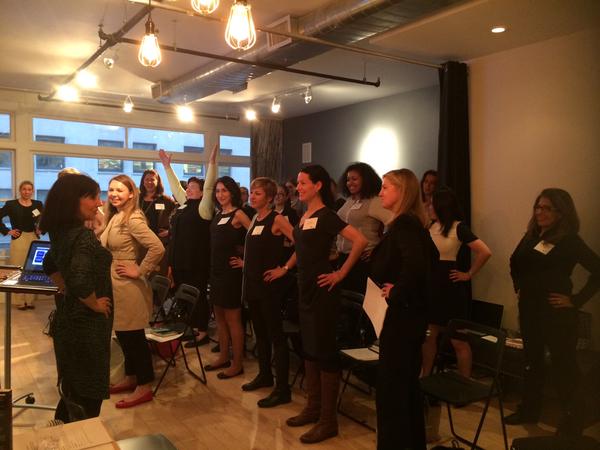Whether speaking in front of a group, a high stakes meeting, or a difficult conversation, we've all faced situations that cause anxiety. Whenever we feel threatened, the lower, primitive brain gets triggered and can hijack the logical brain.
3 Strategies to Conquer Public Speaking Fear
Guest Blog Post: 5 Ways to Create an Exciting Learning Experience to Keep Your learners Engaged
Eager to keep your students engaged? Rest assured that with the utilization of the latest learning tools, you are going to be able to achieve this target. Guest Blogger, Kamy Anderson is an ed-tech enthusiast with a passion for writing on emerging technologies in the areas of corporate training and education.
Creating Fireworks on Stage
No Sweat! Get Control of Public Speaking Nerves
Three people called me this week because their public speaking fear is holding them back. It's affecting their brand, their reputation, and their career advancement. It's causing them to remain quiet in meetings and to decline speaking opportunities. It’s time to knock out the fear of public speaking! Public speaking is no different from any other fear and you can kick the habit long before you kick the bucket.
Press Release: DiResta Speaks to Military Women Veterans at Operation Reinvent
Diane DiResta, CSP, author of Knockout Presentations: How to Deliver Your Message with Power, Punch and Pizzazz, and Founder and CEO of DiResta Communications, a New York City consultancy, was invited to speak to military women veterans at the Operation Reinvent event. The event was a live webcast from NYC to Fort Bragg, North Carolina and Fort Hood, Texas.
The mission of Operation Reinvent is to prepare military women for transition to civilian life.
The Fear Worse Than Public Speaking
 Public speaking is not the top fear. Don't get me wrong. I work with clients all the time to build their confidence so that they can express their ideas. Speaking enables leaders to influence, build relationships, and advance their careers. It's one of the most powerful business and personal skills with far reaching impact.
But public speaking fear is a temporary obstruction. It can be overcome. However, there is another fear that is much greater. It's slowly creeping into our culture.
Public speaking is not the top fear. Don't get me wrong. I work with clients all the time to build their confidence so that they can express their ideas. Speaking enables leaders to influence, build relationships, and advance their careers. It's one of the most powerful business and personal skills with far reaching impact.
But public speaking fear is a temporary obstruction. It can be overcome. However, there is another fear that is much greater. It's slowly creeping into our culture.
It's the loss of freedom of speech.
Today, as we celebrate Independence Day, I heard a disturbing report on a television news segment. The University of North Carolina published a guidebook for employees on how to avoid micro aggression. They listed words that should not be used in conversation. Here are a few:
Don't say:
- Christmas Vacation because it could insult someone who practices a different religion
- Wife/Girlfriend or Husband/Boyfriend because it discriminates against other sexual preferences. (So do I deny I'm married ?)
- Round of Golf because some people can't afford to play (Have they not heard of municipal courses?)
- I Love Your Shoes because that's discriminating against women. (I have never met a woman who was insulted when I complimented her shoes).
ARE THEY KIDDING? What kind of craziness is this? Who could take this seriously? What great material for Saturday Night Live.
I certainly don't mean to single out UNC. There are other universities that actually have designated free speech zones. REALLY? The first amendment of the Bill of Rights grants freedom of speech not in geographic zones but everywhere. The purpose was to limit the power of government and now we have universities telling us what we can say.
The comedian, Jerry Seinfeld stopped performing at colleges because he got tired of political correctness. Where is our sense of humor?
Whoever controls language controls thought. And that's scarier than any fear of speaking in public. This July 4th, let's give thanks for freedom of speech and have the confidence to speak out.
Happy July 4th !


10 Steps to Confidence
Why do we spend years on developing competence when research proves that CONFIDENCE trumps COMPETENCE? Because we falsely believe that it's our smarts and not our hearts that get us to the top. So how do you learn confidence? Here are 10 steps to confidence.
- Clear. Get clear about who you are as a person and get clear about your presentation outcome. Clarity is the first step to confidence. Focus on your message and establish a benchmark for achieving your presentation outcome.
- Other-Centered. Nervousness is self-centeredness. Turn your attention away from you and toward your audience. Ask, "How can I serve them?" "How can I make them comfortable." Do a deep dive into the minds of your listeners. When you profile your audience, you'll speak their language, create rapport, and you'll feel more prepared.
- Natural. There is only one you. You have your own unique style. Don't set out to give a presentation. Be conversational and be yourself. If you're not funny, don't tell a joke. Share something personal and the audience will relate to you.
- Free from Judgment. Eliminate your need for perfection and stop" shoulding" on yourself. Monitor your self-talk. When you begin the presentation, imagine success. When you finish the presentation, give yourself credit for the things you did well. Confidence develops over time and in a positive atmosphere. Mohammed Ali said "I am the greatest," before he was ever a champion
- Improvise. Public speakers who are wedded to their scripts can be easily caught off guard if they lose their place or if there is a technical glitch. Learning to improvise will boost your confidence. When disaster strikes embrace it instead of freezing in place. Prepare your recovery strategy with ad-lib lines.
- Design. Confident delivery sits on well-designed structure. Confidence begins before you ever open your mouth. It starts with good organization. Good structure will keep you focused and on message, And your audience will be able to follow your points.
- Enthusiastic Enthusiasm sells. When you're excited, you forget your nervousness. Speak from your passion and you'll find your energy increases. Raise your energy by doing something physical. Move around the room. Get louder. Use more gestures.Enthusiasm is contagious and your audience will be excited along with you.
- Network. Do you feel like the naked speaker up there all alone? To gain confidence network before you speak. Get to the room early and practice. As people enter, greet each person with a smile and a handshake. By the time it's your turn to speak you'll be in the company of friends.
- Concise. A speech can quickly unravel if the speaker gets stuck in the weeds of details. To feel confident, get to the point. Create crisp message points and build examples around each point. Instead of rolling their eyes, the audience will hang on your every word.
- Engaging. It's hard to feel confident when you're a talking head. Give fewer facts and tell more stories. Why are stories so powerful? Stories draw the audience in, break down resistance and entice them open to your message. Stories make your message memorable. And here's the bonus point.. A story has a natural sequence so you don't have to worry about losing your train of thought. Simply tell the story. Be in the story and your audience will be engaged.
Re-Launch of “Give Fear the Finger”
FOR IMMEDIATE RELEASE March 2016
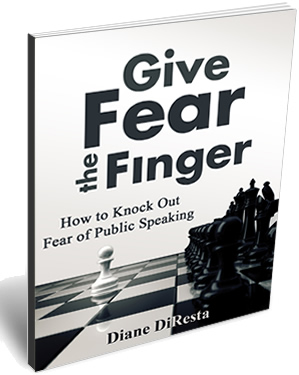 DiResta Communications Recognizes International Women’s Day with Re-Launch of “Give Fear the Finger”
DiResta Communications Recognizes International Women’s Day with Re-Launch of “Give Fear the Finger”
Diane DiResta, author, speaker and owner of DiResta Communications honors the 2016 theme for International Women’s Day—Gender Equality
New York City, NY: “International Women’s Day is a time to reflect on progress made, to call for change and to celebrate acts of courage and determination by ordinary women who have played an extraordinary role in the history of their countries and communities.” The 2016 theme is “Planet 50-50 by 2030: Step It Up for Gender Equality.”
Diane DiResta, in keeping with this theme, is relaunching her latest book, Give Fear the Finger: How to Knock out Fear of Public Speaking and making it available for only $.99 for the rest of the month, starting with International Women’s Day.
Give Fear the Finger shows women (and men) how to never be nervous again. Diane teaches the reader the secrets to being confident and fearless whether speaking to one or 1000. The interactive ebook shows how to stand up to fear and command the platform. Gifted speakers are born but effective speakers are made. Speaking is the new competitive advantage and levels the playing field for women. It gives them visibility they might not access and allows them to have a platform. Speaking let women celebrate their social, economic, cultural and political achievement.
Diane DiResta, who grew up on military bases around the world, began her career as a speech pathologist and now travels internationally teaching interpersonal communications and presentation skills. She traveled to Russia to speak to women entrepreneurs and teaches public speaking in countries like Tanzania, Africa; Bermuda, Brazil, Egypt, Spain and the UK. Diane’s mission is “empowering through the spoken word.”
About Diane DiResta, CSP
Diane DiResta is the founder and CEO of DiResta Communications, Inc, a New York City-based communications skills consultancy serving business leaders who want to communicate with greater impact – whether one-to-one, in front of a crowd, or from an electronic platform. DiResta is a certified speaking professional, a designation held by 12% or professional speakers nationwide. She's also the author of the ebook Give Fear the Finger: How to Knock Out Fear of Public
Speaking and Knockout Presentations, an Amazon.com best seller and widely used text in College business communication courses, entrepreneurship, and more. Celebrated for her inspirational message and inviting presentation style, Diane draws from her knowledge and expertise to engage and motivate her audiences to become the change agents in their own lives and businesses.
For additional information on Diane visit her website - http://diresta.com
To order a copy of Give Fear the Finger for $.99 (beginning Tuesday, March 8) - http://amzn.to/1Y3Bo6k
To schedule an in interview with Diane, contact her publicist, Sandy Lawrence
sandy@perceptivepublicrelations.com
281-989-8892 (Cell)
Is Amy Cuddy's Wonder Woman Pose A Fraud?
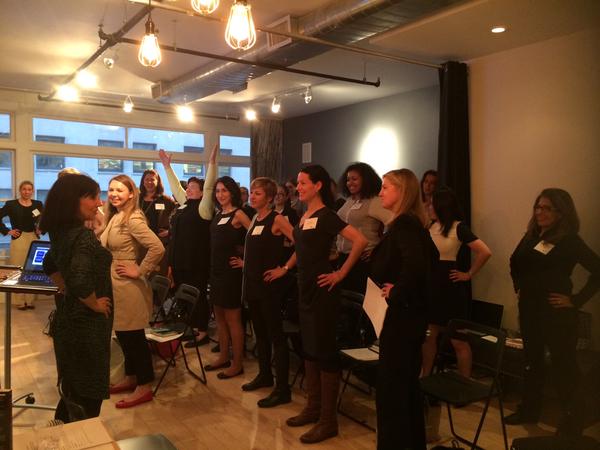 My colleague TJ Walker challenged the validity of Harvard professor, Amy Cuddy's power pose. Amy Cuddy has one of the most popular youtube videos on body language. She advises people to adopt the Wonder Woman pose (hands on hips) to feel powerful when speaking in public. In TJ's twitter post today, he disputes this claim and calls it a fraud.
Here's my opinion. The power pose was recommended to assuage public speaking fear. It's based on neuroscience research and when this pose is held for 2 minutes, there is an increase in testosterone. Higher levels of the hormone, testosterone, are found in those who are risk takers.
My colleague TJ Walker challenged the validity of Harvard professor, Amy Cuddy's power pose. Amy Cuddy has one of the most popular youtube videos on body language. She advises people to adopt the Wonder Woman pose (hands on hips) to feel powerful when speaking in public. In TJ's twitter post today, he disputes this claim and calls it a fraud.
Here's my opinion. The power pose was recommended to assuage public speaking fear. It's based on neuroscience research and when this pose is held for 2 minutes, there is an increase in testosterone. Higher levels of the hormone, testosterone, are found in those who are risk takers.
What was novel was that there was Harvard research backing up her claims. Do I think she's a fraud? No. Unless the research is flawed, it's helpful to have a technique to increase confidence. And there is a body language of confidence. The mind-body connection is widely accepted.
However, as an executive speech coach who works with women leaders and male executives, I don't claim that this one pose is a panacea for public speaking fear, nor does it make you a knockout presenter. TJ makes several good points. Amy Cuddy had a compelling story, a strong structure to her speech, and good visuals. I always tell my clients that great delivery sits on great structure. Your presentation delivery is only as good as your organization. Public speaking success is 90% preparation and 10% delivery.
A client recently hired me for four hours to work on a 15 minute high stakes presentation. That did not include the time she spent with the graphic designer.
So to feel confident, the first step is preparation, planning, and a good, strong message. Presenters need to master their minds as well as their skill set. Does it help to use the power pose? Probably. I teach it to audiences. It makes them feel powerful. But it's not the whole story. There are other physical skills I give them. But I do believe that the mind affects the body and the body affects the mind.
So as long as presenters prepare and practice their message, why not strike a pose and feel powerful?
https://www.youtube.com/watch?v=Ks-_Mh1QhMc
Tell Your Own Stories Not Someone Else's
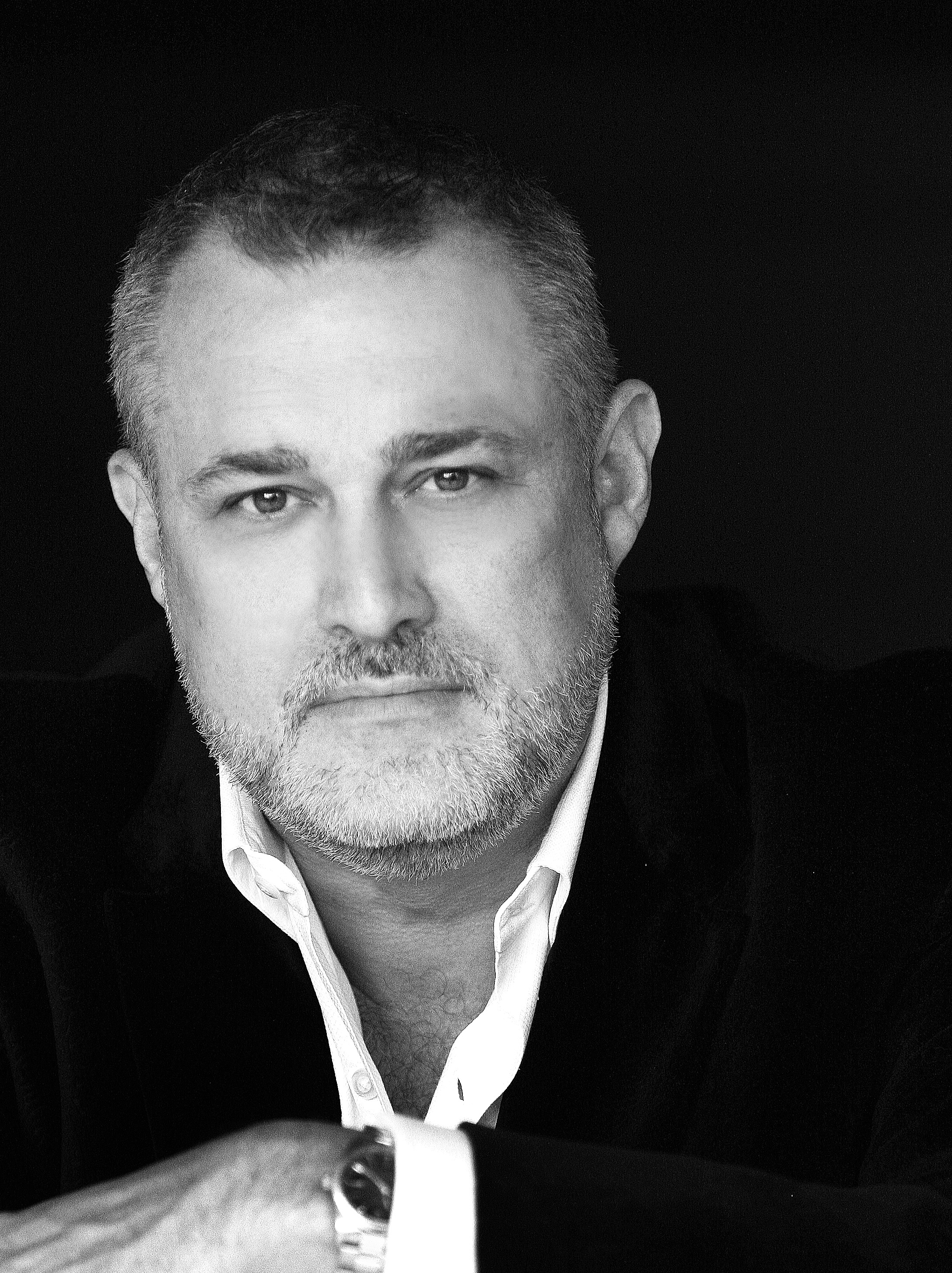 I'm honored to have Jeffrey Hayzlett as a guest blogger.
Whether in life, or in business, there’s no cookie-cutter, surefire way to achieve success, no one plan you have to follow. We all carve our own niche, create our own success, but there are some things all successful entrepreneurs have in common: they Think Big and Act Bigger. Meaning, they tie visions to actions—go beyond the stories and excuses, the self—imposed limitations, preconceived notions and constraining structures to become the biggest, baddest, best versions of themselves.
I'm honored to have Jeffrey Hayzlett as a guest blogger.
Whether in life, or in business, there’s no cookie-cutter, surefire way to achieve success, no one plan you have to follow. We all carve our own niche, create our own success, but there are some things all successful entrepreneurs have in common: they Think Big and Act Bigger. Meaning, they tie visions to actions—go beyond the stories and excuses, the self—imposed limitations, preconceived notions and constraining structures to become the biggest, baddest, best versions of themselves.
Here are five principles that have helped me stay on track throughout my career:
Be Authentic I consider myself a successful businessman, but that success doesn’t come from trophies or accolades. It comes from being me all the time. It’s OK if you’re not everyone’s cup of tea; it’s going to happen. Some of the best people I’ve met act the same way in public (or in a business setting) and at home. That authenticity comes through in every setting – during a meeting or at a keynote. There’s no need to second-guess their motives and they exude trust.
If you’ve been conditioned to think that being yourself is risky, ask yourself why? To me, that sounds exhausting. Having to pretend to be someone else is no way to live. How can your business stand for something when you can’t even stand up for yourself? Being anything less than yourself could have serious repercussions for your business. It can kill morale, productivity, loyalty, vision and eventually, your bottom line.
Adapt, Change or Die Your story will need to revolve over time. That’s a given! However, many people are afraid of changes, thinking that it will change the core of who they are. That couldn’t be further from the truth. It’s OK to evolve, and to even change your mind about things. That doesn’t change your core. If you refuse to evolve and change with the times, you run the risk of being the dinosaur in the room, and we all know what happened to them. Extinction shouldn’t be part of your plan. Ever!
What’s Your Story? That’s one question I ask everyone I meet. I ask, not only because I am interested, but because I’m curious to see how original their story is. I want to see if they stand up for something or if they’ve crafted their story out of someone else’s experience. For example, I am firmly against TED Talks, not because they’re useless, but because I think they cultivate a false sense of idolatry. There are some great people that speak at TED Talk with great, useful advice. But that’s their story; it will never be YOUR story. There’s no single solution to any problem, so while the TED Talks may inspire many, it can create a sheep mentality and not encourage the individuality I look for in people and entrepreneurs.
What Are Your Conditions of Satisfaction? In business, I always adhere to the following criteria: is it going to make me money, will I grow professionally and am I going to have fun doing it? Those are my conditions of satisfaction. I might consider a business opportunity that satisfies two of the three under the right circumstances, but never just one – no matter how good the money is.
Find out what makes you happy and meet your own conditions of satisfaction. Throughout my career, I have learned that violating those conditions, it never ends up well and it usually ends up costing me some money. So unless your last name’s Rockefeller, I wouldn’t recommend losing money on something that doesn’t interest you.
When in doubt, ask yourself the following questions: 1) Who are you? 2) What do you want to do? 3) Where do you want to go? 4) What is your end game? 5) How does it all connect to the story that sells you?
I’ll leave you with the following: the only thing that ever limited me were the voices in my head telling me I couldn’t do something or needed to do it differently. Basically, get out of your own way, ignore the naysayers and forge ahead. Find your own success.
Jeffrey Hayzlett Primetime TV & Radio Host, Keynote Speaker, Best-Selling Author and Global Business Celebrity Jeffrey Hayzlett is a primetime television host of C-Suite with Jeffrey Hayzlett and Executive Perspectives on C-Suite TV, and business radio host of All Business with Jeffrey Hayzlett on CBS on-demand radio network Play.It. He is a global business celebrity, speaker, best-selling author, and Chairman of C-Suite Network, home of the world’s most powerful network of C-Suite leaders. Hayzlett is a well-traveled public speaker, the author of two bestselling business books, The Mirror Test and Running the Gauntlet. His third book, Think Big, Act Bigger, releases September 2015. Hayzlett is one of the most compelling figures in business today.
Jeffrey is a leading business expert, cited in Forbes, SUCCESS, Mashable, Marketing Week and Chief Executive, among many others. He shares his executive insight and commentary on television networks like Bloomberg, MSNBC, Fox Business, and C-Suite TV. Hayzlett is a former Bloomberg contributing editor and primetime host, and has appeared as a guest celebrity judge on NBC’s Celebrity Apprentice with Donald Trump for three seasons. He is a turnaround architect of the highest order, a maverick marketer and C-Suite executive who delivers scalable campaigns, embraces traditional modes of customer engagement, and possesses a remarkable cachet of mentorship, corporate governance, and brand building.
3 Magic Words that Kill Public Speaking Fear
 Did you ever wonder if there was an Aladdin's Lamp for public speaking? All you would need to do is ask the Genie for the magic words to eliminate fear of public speaking or performance anxiety. Just like the eternal search for the fountain of youth, people still yearn for that elixir, potion, or formula that will make their nervousness vanish.
What I've discovered is that the words you speak have the power to transform how you think. It's not what you say but how you think about your fear. A number of years ago I spoke to a group of company leaders. They, like everyone else, were nervous about public speaking. At one point I looked them straight in the eye and made a statement. After the training seminar, people told me that those words were very powerful and changed how they thought about public speaking.
Did you ever wonder if there was an Aladdin's Lamp for public speaking? All you would need to do is ask the Genie for the magic words to eliminate fear of public speaking or performance anxiety. Just like the eternal search for the fountain of youth, people still yearn for that elixir, potion, or formula that will make their nervousness vanish.
What I've discovered is that the words you speak have the power to transform how you think. It's not what you say but how you think about your fear. A number of years ago I spoke to a group of company leaders. They, like everyone else, were nervous about public speaking. At one point I looked them straight in the eye and made a statement. After the training seminar, people told me that those words were very powerful and changed how they thought about public speaking.
Fast forward to a coaching client who was afraid to speak up in her class. She even thought about dropping out of law school because she was so nervous about public speaking. I told her the same thing I told every public speaker. And then it happened. She started to think differently after I shared those famous words with her. She graduated from law school and went on to give presentations without fear.
Most recently, a former client called me for a refresher. She told me her manager noticed a big improvement in her presentation and the way she interacted with clients. He offered her the refresher coaching session to prepare for their upcoming high stakes presentation. During the meeting, my client shared with me that the words I said to her truly changed how she thought about presentations and public speaking. Are the words really magical? No! The words themselves contain nothing magical. What the words did was reframe the way people were thinking about their fear. They were viewing public speaking through a negative frame and that triggered anxiety.
Even though I'm a seasoned professional speaker, I found myself getting nervous the day before a presentation. It was a 10 minute spotlight for the National Speakers Association. I confided to my friend that I was a nervous wreck. I couldn't wait for it to be over. My friend grabbed me by the shoulders and said, "Diane, don't do that to yourself. You're not nervous. You're energized." So I went home and recited my new mantra: "I'm energized. I'm energized." The next morning I gave my speech and it was a success. Words do make a difference.
The 3 magic words have made an impact on so many people. I think it is time I share them with you. So what are the 3 Magic Words that help people face their fear?
"It's About Them."
When I speak to audiences of nervous presenters, I tell them, "Get over yourself. It's not about you. It's about them." What they've come to realize is that at the very core of public speaking nervousness is a feeling of being self-centered. That's right. If you focus on the fear, you're thinking about yourself. If you think about what the audience wants and needs, you're coming from a place of service.
Language reflects thought. Change your language and you'll change your thinking. The next time anxiety occupies your mind, change your focus. Tell yourself, "It's about them."
What have you said to yourself to change your thinking?
Press Release: Women in Consumer Electronics Hires Diane DiResta as a Public Speaker
Diane DiResta was hired to give a fireside chat at the Women in Consumer Electronics conference at the Rubin Museum in New York City. The theme was "Find Your Voice, Own Your Career." DiResta was interviewed on stage by Award-winning journalist Andrea Smith. The two discussed whether women get fewer opportunities than men.
What's Triggering Your Public Speaking Fear?
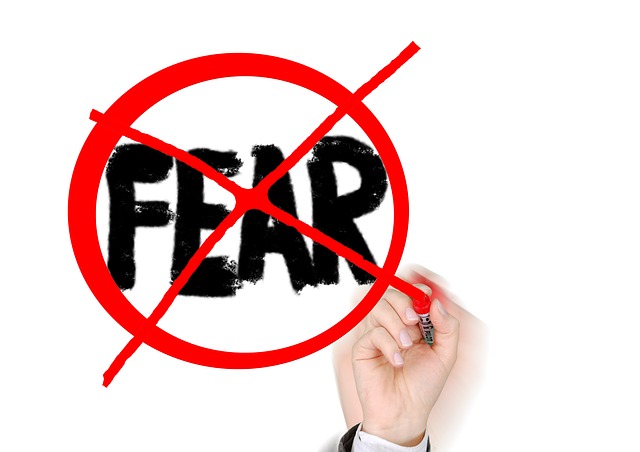 We've all been there - the racing heart, the sweating palms, the cotton mouth. Many clients call me because they're nervous or experiencing public speaking panic. The mere thought of public speaking can trigger anxiety in some presenters.
May is Better Speech and Hearing Month and it's a good time to assess the state of your speaking skills.
We've all been there - the racing heart, the sweating palms, the cotton mouth. Many clients call me because they're nervous or experiencing public speaking panic. The mere thought of public speaking can trigger anxiety in some presenters.
May is Better Speech and Hearing Month and it's a good time to assess the state of your speaking skills.
Ask yourself these questions:
- What do I see when I think of myself speaking?
- What do I say to myself?
- How do I think I'll feel when I finish my speech?
I would bet a lot of money that the answers to those questions are negative. The act of public speaking is neutral. We charge it with anxious energy by the way we think. Successful speakers know that confidence begins in the mind.
So in honor of Better Speech and Hearing Month, resolve to watch this public speaking affirmations video everyday. The only thing that's triggering your public speaking fear is you.


